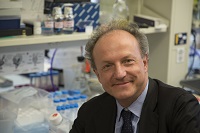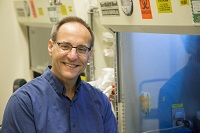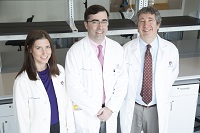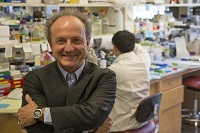2018 CRI News and Publications
2018 Highlights
Carmelo Nucera, MD, PhD, Presented with the American Thyroid Association’s 2018 Van Meter Award
December 2018
 Carmelo Nucera, MD, PhD, Primary Investigator in the thyroid cancer research program in Department of Pathology at BIDMC, was presented with the 2018 Van Meter Award by the American Thyroid Association (ATA). The award recognizes outstanding contributions to research on the thyroid gland or related subjects by an investigator who is age 45 or under.
Carmelo Nucera, MD, PhD, Primary Investigator in the thyroid cancer research program in Department of Pathology at BIDMC, was presented with the 2018 Van Meter Award by the American Thyroid Association (ATA). The award recognizes outstanding contributions to research on the thyroid gland or related subjects by an investigator who is age 45 or under.
Pier Paolo Pandolfi, MD, PhD, Elected to the Fellowship of the Royal College of Physicians of London
December 2018
 Pier Paolo Pandolfi, MD, PhD, Director of the Cancer Center and Cancer Research Institute, was elected to the fellowship of the Royal College of Physicians of London. Fellows are elected based on the endorsement of both national and international fellows who wish to recognize contributions to medicine.
Pier Paolo Pandolfi, MD, PhD, Director of the Cancer Center and Cancer Research Institute, was elected to the fellowship of the Royal College of Physicians of London. Fellows are elected based on the endorsement of both national and international fellows who wish to recognize contributions to medicine.
Lowell Schnipper, MD, Receives the Massachusetts Society of Clinical Oncologists Oncologist of the Year Award
December 2018
 Lowell Schnipper, MD, Emeritus Clinical Director of the Cancer Center at BIDMC, received the Massachusetts Society of Clinical Oncologists Oncologist of the Year Award. Schnipper is recognized for his research and innovations that has had a transforming and lasting impact in areas cancer research, clinical trials, patient advocacy activities, and outstanding long-term service to the field of oncology.
Lowell Schnipper, MD, Emeritus Clinical Director of the Cancer Center at BIDMC, received the Massachusetts Society of Clinical Oncologists Oncologist of the Year Award. Schnipper is recognized for his research and innovations that has had a transforming and lasting impact in areas cancer research, clinical trials, patient advocacy activities, and outstanding long-term service to the field of oncology.
Prostate Cancer Foundation Presents Stewart J. Rahr Foundation-PCF Challenge Award to Steven Balk, MD, David Avigan, MD, and David Einstein, MD
December 2018
 Steven Balk, MD, David Avigan, MD, and David Einstein, MD, of BIDMC’s Division of Hematology/Oncology, were given the Stewart J. Rahr Foundation-PCF Challenge Award of $1 million presented by The Prostate Cancer Foundation. Project teams consist of highly experienced investigators capable of providing unique scientific expertise to the solution of a significant problem in prostate cancer research. The team will conduct experimental studies and clinical trials to identify and validate biomarkers that classify prostate cancer patients most likely to respond to checkpoint immunotherapy.
Steven Balk, MD, David Avigan, MD, and David Einstein, MD, of BIDMC’s Division of Hematology/Oncology, were given the Stewart J. Rahr Foundation-PCF Challenge Award of $1 million presented by The Prostate Cancer Foundation. Project teams consist of highly experienced investigators capable of providing unique scientific expertise to the solution of a significant problem in prostate cancer research. The team will conduct experimental studies and clinical trials to identify and validate biomarkers that classify prostate cancer patients most likely to respond to checkpoint immunotherapy.
Cancer Center’s Standard of Cure Cancer Symposium Highlights the ‘Revolution’ in Immunotherapy and Targeted Therapies
October 31, 2018
 The 11th Annual BIDMC Standard of Cure Cancer Symposium, presented by the Cancer Center at BIDMC, captured a new attendance record with more than 600 attendees coming together to learn about the latest in the targeted therapy and immunotherapy cancer research revolution.
The 11th Annual BIDMC Standard of Cure Cancer Symposium, presented by the Cancer Center at BIDMC, captured a new attendance record with more than 600 attendees coming together to learn about the latest in the targeted therapy and immunotherapy cancer research revolution.
Padmanee Sharma, MD, PhD, Recognized with Pandolfi Award for Women in Cancer Research
October 31, 2018
 Padmanee Sharma, MD, PhD, of the University of Texas MD Anderson Cancer Center, was recognized for her significant contributions to the field of immuno-oncology with the Pandolfi Award for Women in Cancer Research at the 11th Annual BIDMC Cancer Symposium sponsored by the Cancer Center at BIDMC.
Padmanee Sharma, MD, PhD, of the University of Texas MD Anderson Cancer Center, was recognized for her significant contributions to the field of immuno-oncology with the Pandolfi Award for Women in Cancer Research at the 11th Annual BIDMC Cancer Symposium sponsored by the Cancer Center at BIDMC.
The Cancer Center at BIDMC Opens a Personalized Immunotherapy Cancer Vaccine Facility
September 17, 2018
 The Cancer Center at BIDMC announced the opening of the Randi and Brian Schwartz Family Cancer Immunotherapy and Cell Manipulation Facility. The state-of-the-art laboratory expands BIDMC’s research capacity with the ultimate goal of accelerating the delivery of new immunotherapies to patients with cancer.
The Cancer Center at BIDMC announced the opening of the Randi and Brian Schwartz Family Cancer Immunotherapy and Cell Manipulation Facility. The state-of-the-art laboratory expands BIDMC’s research capacity with the ultimate goal of accelerating the delivery of new immunotherapies to patients with cancer.
Cancer Center at BIDMC Launches Immunotherapy Institute
May 3, 2018
 The Cancer Center at BIDMC announced the launch of a new clinical and research institute that will build on BIDMC’s long history of leadership in immunotherapy and cell therapeutics. Under the leadership of Co-Directors David Avigan, MD, and David McDermott, MD, and Deputy Director Jacalyn Rosenblatt, MD, the Immunotherapy Institute will harness the potential of immunotherapy as it revolutionizes the way cancer and ultimately other diseases are treated and diagnosed. “The Immunotherapy Institute will help us not only improve upon the standard of care, but reach our goal of the ‘Standard of Cure’ in cancer care and research,” said Pier Paolo Pandolfi, MD, PhD, Director of the Cancer Center and Cancer Research Institute at BIDMC.
The Cancer Center at BIDMC announced the launch of a new clinical and research institute that will build on BIDMC’s long history of leadership in immunotherapy and cell therapeutics. Under the leadership of Co-Directors David Avigan, MD, and David McDermott, MD, and Deputy Director Jacalyn Rosenblatt, MD, the Immunotherapy Institute will harness the potential of immunotherapy as it revolutionizes the way cancer and ultimately other diseases are treated and diagnosed. “The Immunotherapy Institute will help us not only improve upon the standard of care, but reach our goal of the ‘Standard of Cure’ in cancer care and research,” said Pier Paolo Pandolfi, MD, PhD, Director of the Cancer Center and Cancer Research Institute at BIDMC.
BIDMC-Led Team Develops New Approach to Study Non-Coding RNAs
April 19, 2018
 An international team of researchers used a CRISPR activation screen to identify both coding and non-coding pathways involved in acquired resistance to cytarabine, the main treatment for acute myeloid leukemia. The study – led by Pier Paolo Pandolfi, MD, PhD, Director of the Cancer Center and Cancer Research Institute at BIDMC – was published in the journal Cell.
An international team of researchers used a CRISPR activation screen to identify both coding and non-coding pathways involved in acquired resistance to cytarabine, the main treatment for acute myeloid leukemia. The study – led by Pier Paolo Pandolfi, MD, PhD, Director of the Cancer Center and Cancer Research Institute at BIDMC – was published in the journal Cell.
Flipping the Switch: Dietary Fat, Changes in Fat Metabolism May Promote Prostate Cancer Metastasis
 January 15, 2018
January 15, 2018
In a set of papers in the journals Nature Genetics and Nature Communications, researchers at the Cancer Center at BIDMC shed new light on the genetic mechanisms that promote metastasis in the mouse model and also implicated the typical Western high-fat diet as a key environmental factor driving metastasis. The study – led by senior author Pier Paolo Pandolfi, MD, PhD, Director of the Cancer Center and Cancer Research Institute at BIDMC, and first author Ming Chen, PhD, a research fellow in the Pandolfi’s laboratory – could result in more accurate and predictive mouse models for metastatic prostate cancer, which in turn could accelerate discovery of better therapies for the disease.
Non-Coding RNA Precision Diagnostics and Therapeutics Core Facility Opens at Beth Israel Deaconess Medical Center
January 17, 2018

The Cancer Center and the Department of Pathology at BIDMC opened a state-of-the-art facility dedicated to the study of non-coding RNAs (ncRNA). The Non-Coding RNA Precision Diagnostics and Therapeutics Core Facility will help accelerate the discovery and translation of ncRNA diagnostics and therapeutics, with the hope of leading to better cures and treatments for disease.
Cancer's Gene-Determined “Immune Landscape” Dictates Progression of Prostate Tumors
January 11, 2018
 Researchers led by Pier Paolo Pandolfi, MD, PhD, Director of the Cancer Center and Cancer Research Institute at BIDMC, demonstrated that genetic variations driving prostate cancer determine the composition of the immune cells that infiltrate primary prostate tumors. These immune cells, in turn, dictate tumor progression and response to treatment. The data, published in Nature Medicine, suggest that profiling patients’ tumors based on this new information could lead to more successful clinical trials and tailored therapies for patients.
Researchers led by Pier Paolo Pandolfi, MD, PhD, Director of the Cancer Center and Cancer Research Institute at BIDMC, demonstrated that genetic variations driving prostate cancer determine the composition of the immune cells that infiltrate primary prostate tumors. These immune cells, in turn, dictate tumor progression and response to treatment. The data, published in Nature Medicine, suggest that profiling patients’ tumors based on this new information could lead to more successful clinical trials and tailored therapies for patients.
